

Freedom of Access to Information and Resources. Inclusion as a topic covers a broad church from gender and sexual identity, to culture, to religion, to language, to remoteness, to age, to living with difference in abilities.
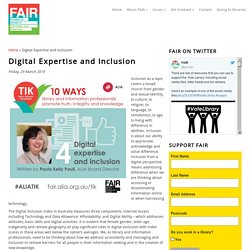
Inclusion is about our ability to appreciate, acknowledge and value difference. Inclusion from a digital perspective means addressing difference when we are thinking about accessing or disseminating information online or when harnessing technology. The Digital Inclusion Index in Australia measures three components: Internet Access including Technology and Data Allowance; Affordability; and Digital Ability – which addresses attitudes, basic skills and digital activities. It is evident that female gender, older age, Indigeneity and remote geography all play significant roles in digital exclusion with index scores in these areas well below the nation’s averages. The role that libraries can play in this arena is even more important than ever. Digital Skills Is Not The Same As Digital Literacy – FINDING HEROES. Digital skills is following a step by step process of creating an email account.
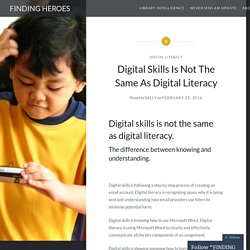
Digital literacy is recognising spam, why it is being sent and understanding how email providers use filters to minimise potential harm. Releases Horizon Project Strategic Brief on Digital Literacy. A new report, supported by Adobe, aims to establish a shared vision of digital literacy and serve as a call to action for higher education leaders across the United States.
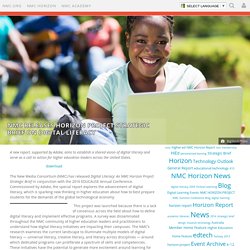
The New Media Consortium (NMC) has released Digital Literacy: An NMC Horizon Project Strategic Brief in conjunction with the 2016 EDUCAUSE Annual Conference. Commissioned by Adobe, the special report explores the advancement of digital literacy, which is sparking new thinking in higher education about how to best prepare students for the demands of the global technological economy. This project was launched because there is a lack of consensus across the field about how to define digital literacy and implement effective programs. A survey was disseminated throughout the NMC community of higher education leaders and practitioners to understand how digital literacy initiatives are impacting their campuses. > Download the report (PDF) The Best Research and Reference Sites Online. Whether you're looking for the average rainfall in the Amazon rainforest, researching Roman history, or just having fun learning to find information, you'll get some great help using my list of the best research and reference sites on the Web.
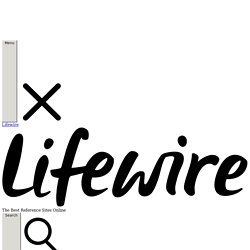
Types of Reference Sites There are generally two types of reference sites. The first consist of specialized Web sites maintained by subject experts, who will provide detailed and specific responses to your questions. Make Your Web Searches Better With These Ten Tips. Ever been frustrated with your web search results?
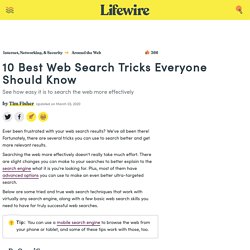
We've all been there! Fortunately, there are several tricks you can use to search better and get more relevant results. Searching the web more effectively doesn't really take much effort. There are slight changes you can make to your searches to better explain to the search engine what it is you're looking for. Plus, most of them have advanced options you can use to make an even better ultra-targeted search. Below are some tried and true web search techniques that work with virtually any search engine, along with a few basic web search skills you need to have for truly successful web searches.
You can use a mobile search engine to browse the web from your phone or tablet, and some of these tips work with those, too. Be Specific The more relevant words you use in your search, the more successful your results will be. For example, entering coffee when trying to find coffee shops in Michigan would provide far too many unnecessary results. Simple Google Search Tricks: The Top Ten. Updated December 28, 2016 Google is the most popular search engine on the Web, but most people don't realize how much more powerful they can make their Google searches with just a few simple tweaks.
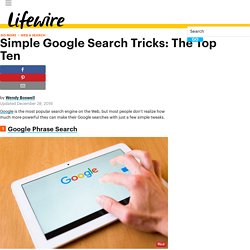
Google Phrase Search If you want Google to return your search as a complete phrase, in the exact order and proximity that you typed it in as, then you’ll need to surround it with quotes; i.e., “three blind mice.” Otherwise, Google will just locate these words either separately OR together. 1-Page MultiSearch Engines © with All META and Major Search Engines - bjorgul.com. Welcome to Open Library. CommercePipe: Australian Business Data. About. About. Open Access in Australia – Australasian Open Access Strategy Group. Australian institutions with Open Access mandates, policies or statements Australian funding body open access policies Page last updated 28 October 2015 Like this: Like Loading...
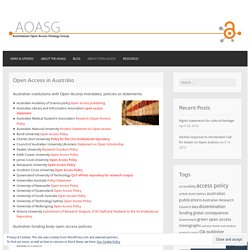
Theconversation. Australia spends more than $30 billion a year on projects which produce “grey literature” - documents which are produced by government departments, academic institutions, private companies and more.
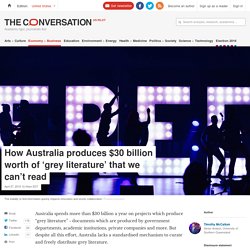
But despite all this effort, Australia lacks a standardised mechanism to curate and freely distribute grey literature. There has never been a better time, than right now, to investigate opportunities into improving our country’s memory. Government agencies allocate billions of dollars, each year, to research projects and programs. These activities produce research papers, conference papers and other forms of grey literature. Examples of these agencies include The Australian Research Council and The National Health and Medical Research Council. Students in the higher education sector also produce high quality grey literature in the form of Theses and Dissertations.
The importance of grey literature. Infoxchange. Institut culturel de Google.